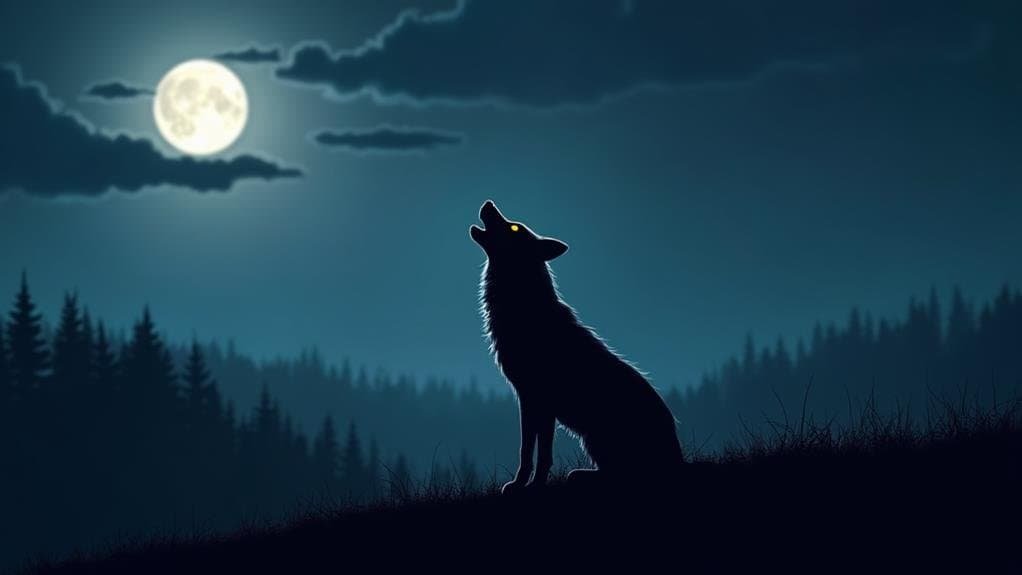Your dog's nighttime howling is rooted in ancestral instincts and can be triggered by various factors. It's a form of long-distance communication, similar to their wolf ancestors, and may express emotions like loneliness or distress. Common triggers include high-pitched sounds, environmental changes, and separation anxiety. Health issues, such as pain or cognitive dysfunction in older dogs, can also cause howling. Some breeds, like Huskies and Beagles, are more prone to this behavior. To reduce nighttime howling, establish a consistent bedtime routine, provide plenty of exercise, and create a comfortable sleeping environment. Understanding the underlying causes will help you address your furry friend's vocal tendencies more effectively.
Ancestral Instincts and Communication

Man's best friend may be keeping you up at night with their haunting melodies, but there's more to their howls than meets the ear. Your dog's howling is deeply rooted in their ancestral instincts, serving as a powerful form of communication that dates back to their wolf ancestors.
When your furry friend lets out a long, mournful howl, they're tapping into their heritage as pack animals.
Here's why your dog might be howling:
- Sending messages: Dogs use howling to convey information over long distances, just like their wild counterparts.
- Expressing emotions: If your pup is feeling lonely or distressed, they might howl to express these feelings.
- Calling the pack: Howling can be a way for dogs to alert others to their presence or locate missing pack members.
It's important to note that some breeds, like Siberian Huskies and Beagles, are more prone to howling due to their genetic makeup.
So, if you've got one of these chatty canines, you might hear more nighttime serenades than other dog owners.
Understanding these ancestral instincts can help you better connect with your four-legged friend and appreciate their unique form of expression.
Common Triggers for Nighttime Howling
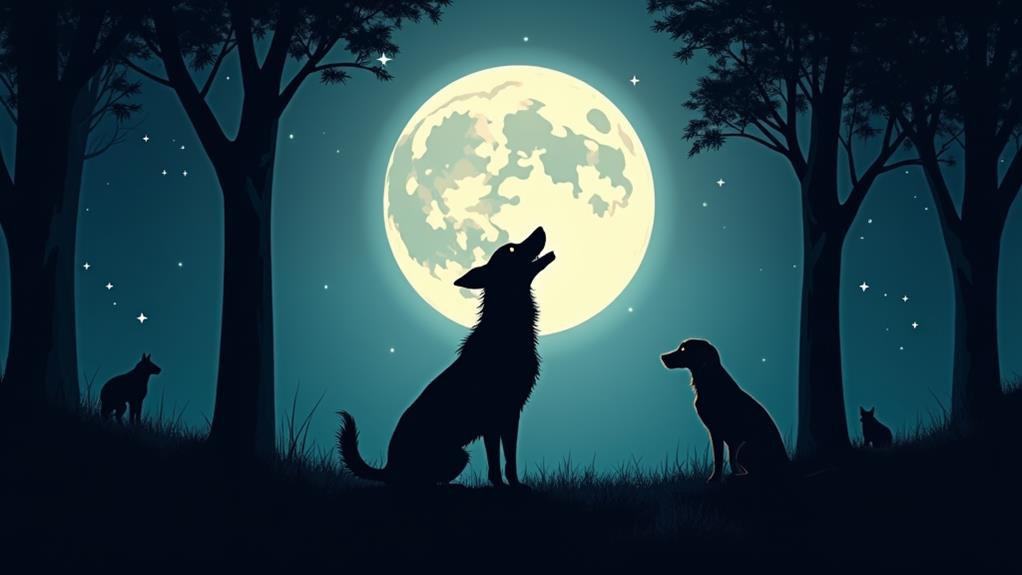
As night falls, your dog's howling might kick into high gear, leaving you wondering what's triggering this nocturnal chorus. There are several common reasons why dogs howl at night, and understanding these can help you address the behavior.
- High-pitched sounds: Your furry friend might be responding to sirens, alarms, or other shrill noises that trigger their ancestral instincts.
- Environmental changes: New surroundings or unfamiliar noises can set off your dog's howling as they react to potential threats.
- Separation anxiety: If you're away for long periods, your pup might be expressing their distress through howls at night.
- Social communication: Your dog may be joining in with other neighborhood canines, participating in a doggy version of a social media chain.
- Hunger or discomfort: An inadequate diet can lead to nighttime howling as your pooch signals their unmet needs.
Health-Related Causes of Howling
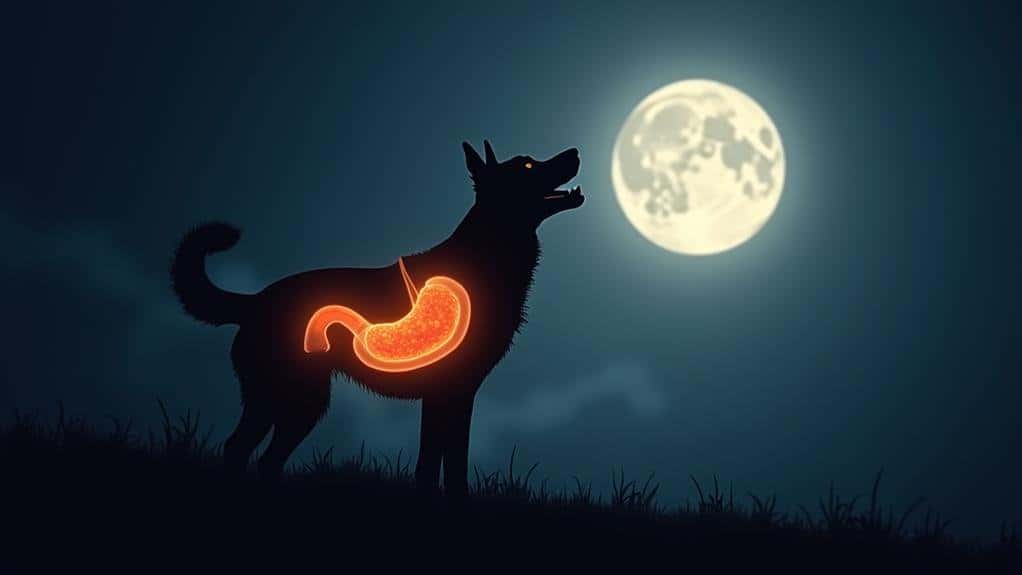
Four health-related causes can trigger your dog's nighttime howling, signaling more than just a noisy nuisance. Understanding these underlying issues is essential for your furry friend's well-being.
1. Pain or Discomfort
If your pup suddenly starts howling at night, it might be experiencing pain or discomfort. These unexpected vocalizations could indicate various health issues, from minor aches to more serious conditions.
Don't ignore these nighttime howls – they may be your dog's way of asking for help!
2. Cognitive Dysfunction
As dogs age, they can develop cognitive issues similar to dementia in humans. If your older pooch seems confused or disoriented, especially at night, their howls might be a sign of cognitive dysfunction.
This condition can lead to increased vocalization and changes in sleep patterns.
3. Separation Anxiety
Your dog's nighttime howls could be a cry for attention if they're feeling lonely or anxious. Separation anxiety can manifest as excessive vocalization when your furry companion feels isolated during the wee hours.
4. Neurological Disorders
Sometimes, howling can be linked to neurological disorders or hearing loss. These conditions may cause your dog to vocalize more frequently, especially at night.
If you're concerned about your dog's nighttime howling, it's best to schedule a veterinary examination to rule out any underlying health problems.
Behavioral Factors Behind Howling
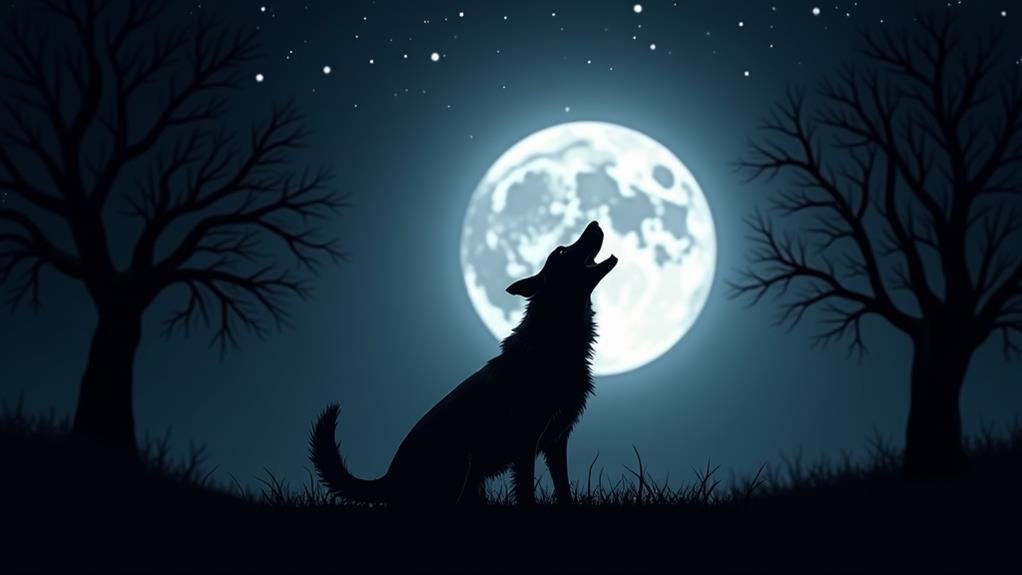
While health issues can trigger nighttime howling, behavioral factors often play a significant role in your dog's vocal expressions. Understanding these factors can help you address the root causes of your furry friend's nighttime serenades.
Here are some likely reasons your dog is howling at night:
- Separation anxiety: If your pup feels lonely or stressed when left alone, they may howl to express their distress. This is especially common if there's been a change in their routine or living situation.
- Attention-seeking behaviors: Your dog might've learned that howling gets your attention, even if it's negative. They're simply trying to communicate their needs or desires.
- Response to unfamiliar sounds: Dogs are sensitive to their environment, and new or unusual noises can trigger howling. This could be anything from sirens to other dogs howling in the neighborhood.
To help reduce nighttime howling:
- Establish consistent routines for feeding, exercise, and bedtime.
- Provide plenty of mental and physical stimulation during the day.
- Create a comfortable, quiet sleeping area for your dog.
- Consider crate training or using white noise to minimize external stimuli.
Environmental Influences on Howling
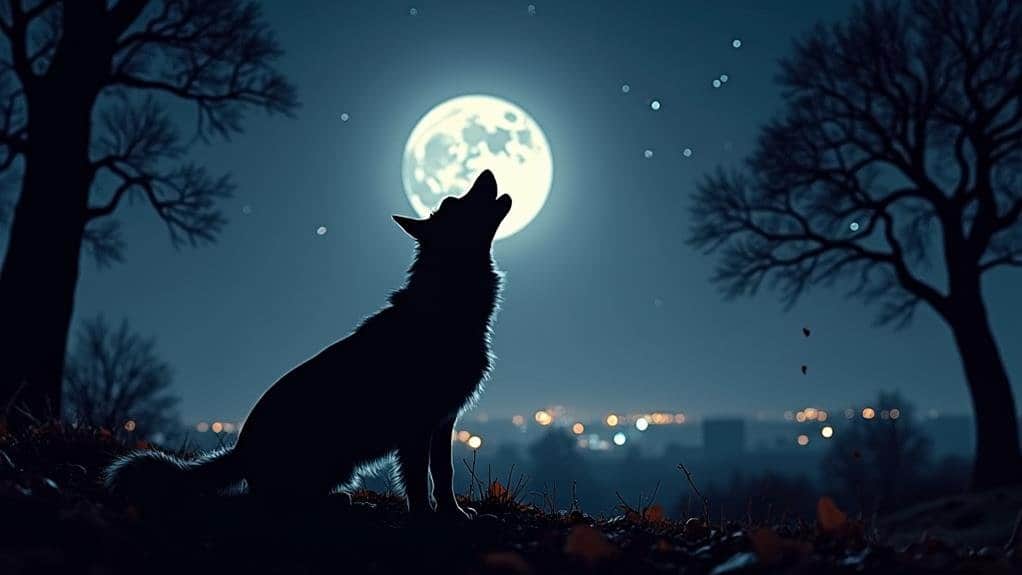
Environmental factors play an essential role in your dog's nighttime howling behavior. Understanding these influences can help you address the root causes of why dogs howl at night and create a more peaceful environment for both you and your furry friend.
1. External Noises
Your dog's instinctual responses to loud sounds like sirens or traffic can trigger howling. These noises may remind them of their wolf ancestors' communication methods, prompting them to join in the "conversation."
2. Changes in the Home
Moving to a new house or introducing new pets can cause anxiety in your dog, leading to increased nighttime vocalizations. It's important to help your pup adjust gradually to these changes to minimize stress-related howling.
3. Wildlife and Other Dogs
Nocturnal animals and neighboring dogs can provoke your pet's territorial instincts, resulting in howling as a form of communication or assertion.
4. Comfort Issues
An uncomfortable sleeping area can lead to restlessness and howling. Verify your dog has a cozy bed or crate to promote better sleep habits.
5. Separation Anxiety
Changes in routine or family members' absences can exacerbate separation anxiety, causing your dog to howl more frequently at night.
Breed-Specific Howling Tendencies
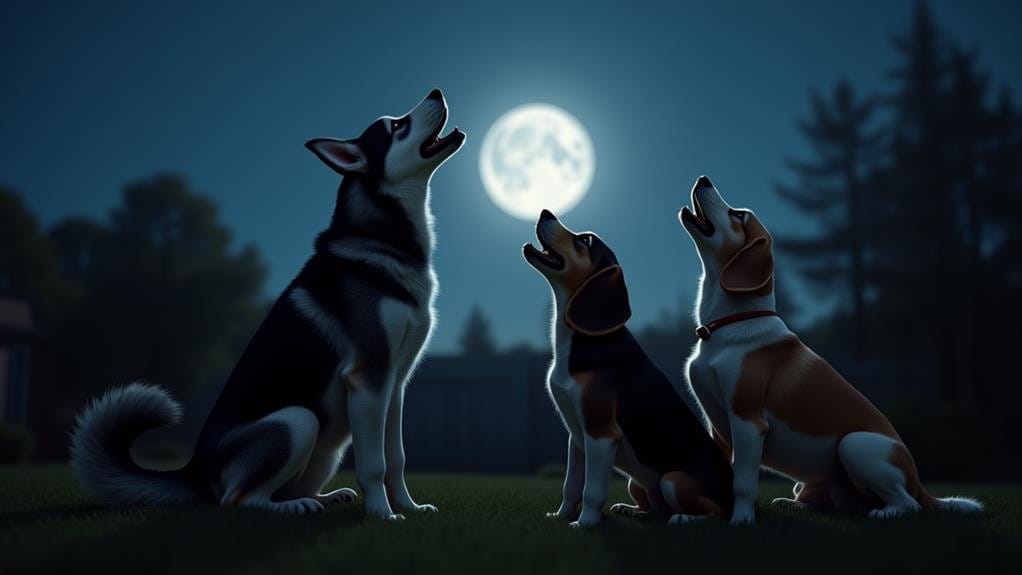
Beyond environmental factors, your dog's breed plays a significant role in their howling tendencies. If you've noticed your furry friend serenading the moon more often than not, it might be due to their ancestral lineage. Certain breeds are genetically predisposed to vocal communication, making them more likely to express themselves through howling.
1. Northern breeds and hunting dogs:
Siberian Huskies and Beagles, for example, have a strong connection to their pack-oriented ancestors. These breeds often use howling as a way to communicate with their human or canine pack members.
2. Surprisingly vocal small breeds:
Don't be fooled by size! Yorkshire Terriers and Chihuahuas can be quite the howlers, using their voices to seek attention or express anxiety.
3. Working and herding breeds:
German Shepherds may engage in howling as a form of territorial assertion, reflecting their protective instincts.
If you're wondering why your pup's howling tendencies seem more pronounced than others, consider their breed-specific traits.
Strategies to Reduce Nighttime Howling
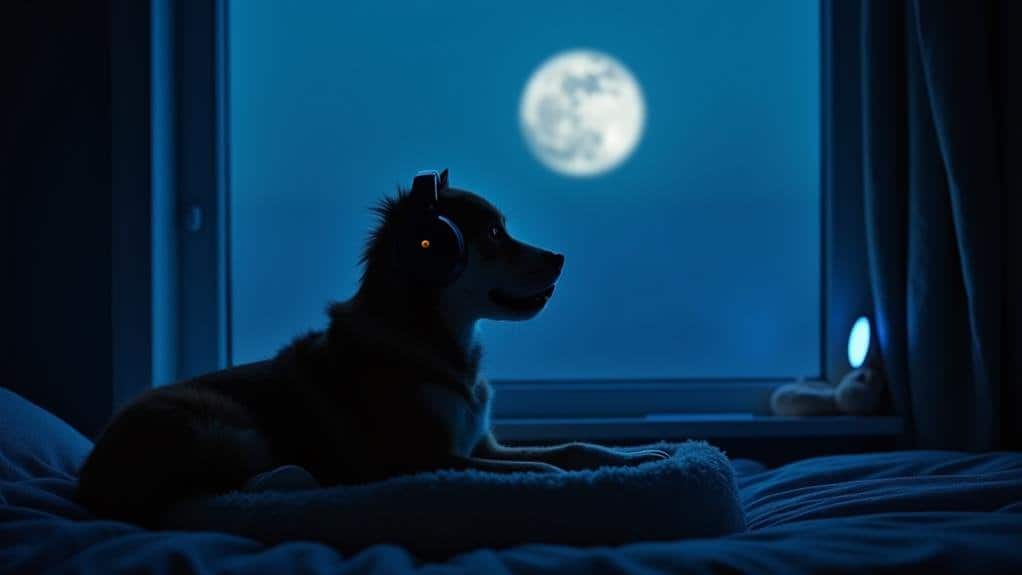
Five effective strategies can help reduce your dog's nighttime howling, allowing both you and your furry friend to enjoy a peaceful night's sleep.
First, establish a consistent bedtime routine to create a sense of security for your pup. This predictability can ease anxiety and minimize vocalizations.
Second, tire your dog out with plenty of exercise and mental stimulation during the day. A well-exercised pooch is more likely to sleep soundly through the night.
Third, try desensitization techniques to help your dog become less reactive to nighttime noises. Gradually expose them to recorded sounds that typically trigger howling, helping them become more comfortable over time.
Fourth, use positive reinforcement to reward quiet behavior and redirect your dog's attention when they start to howl. This can teach them that silence is golden!
Lastly, create a cozy sleeping environment for your furry friend. Provide comfortable bedding and familiar items to reduce anxiety and promote restful sleep.
Frequently Asked Questions
What Does It Mean When a Dog Howls at Night?
When your dog howls at night, it's communicating. It might be feeling anxious, responding to noises, or experiencing discomfort. It could also be seeking attention or releasing excess energy. Consider your dog's needs and environment to understand why.
What Does It Mean When a Dog Howls at 3am?
If your dog howls at 3am, it's likely responding to environmental triggers, experiencing anxiety, or feeling hungry. It could also be adjusting to changes or experiencing discomfort. You'll want to investigate the cause and address it appropriately.
Should I Ignore My Dog Howling at Night?
You shouldn't automatically ignore your dog's nighttime howling. First, rule out medical issues or environmental triggers. If it's attention-seeking, ignoring can be effective. However, for anxiety or distress, you'll need to address the underlying cause through training.
Are Dogs Happy When They Howl?
Dogs aren't always happy when they howl. You'll need to take into account the context. They might be excited, playful, or responding to sounds. It's often a social behavior, but it can also indicate loneliness or distress. Watch for other cues.
Conclusion
You've now learned that your dog's nighttime howling isn't just to annoy you! It's a complex behavior rooted in their ancestry, health, and environment. By understanding these factors, you're better equipped to address your furry friend's vocal tendencies. Remember, patience and consistency are key when working to reduce unwanted howling. With some adjustments and training, you and your pup can enjoy peaceful nights together. Don't forget, a little howling now and then is just part of your dog's charm!

